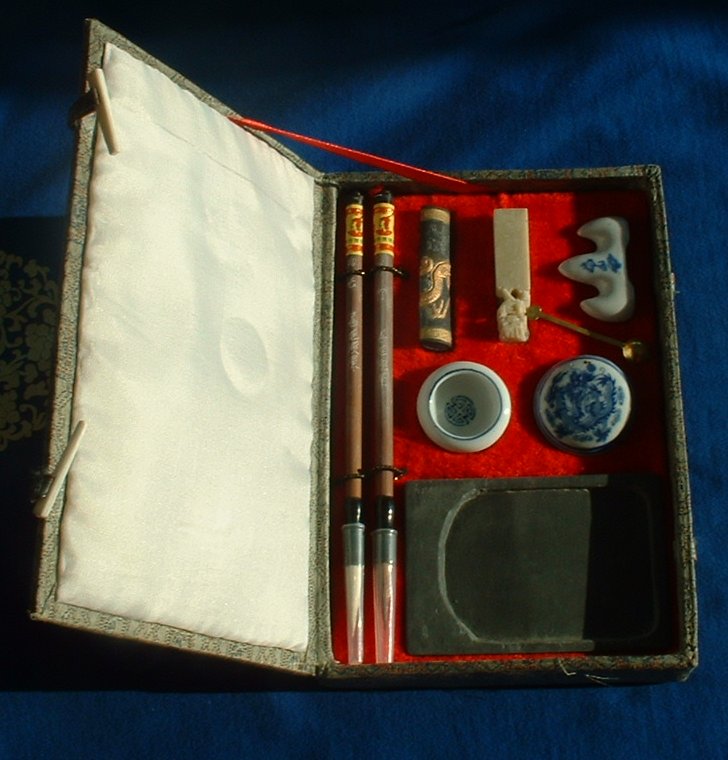For some reason Chinese people (and their sphere of influence such as Japan) are obsessed by numbered lists, e.g. stuff like Four Beauties, Four Treasures of the Study and so on!
On Wikipedia we only find the term Scholar-official. But the idea of the ancient Chinese scholar is a bit wider as a concept, and even people who were not trying to be officials could thrive to follow certain aspects of the scholar way of life.
Particular attributes the ideal Chinese scholar would have include:It is in a sense sad (or awesome) that the computer has essentially replaced, or one may argue, enhanced beyong recognition, all of the traditional four arts, to the point that Ciro can't touch anything that is not a computer. Sometimes the old arts live on particularly closely though, e.g. in computer music, computer graphics and computer Go.
- mastery of the Four arts, which also implies the Four Treasures of the Study for caligraphy and painting
- live in a place that includes
One of the best in the world, but you need to know how to find real restaurants if you are not in China.
But worry not, Ciro Santilli has got you covered: github.com/cirosantilli/china-dictatorship/restaurants
- www.youtube.com/channel/UC54SLBnD5k5U3Q6N__UjbAw Chinese Cooking Demystified. Possibly the best YouTube channel at explaining how to make key Chinese dishes and sauces in English.
Some stuff at: cirosantilli.com/china-dictatorship/#the-best-chinese-food but that is bound to die one guesses.
This classification is too restrictive, and too South-centered. But if is worth knowing.
Pinned article: Introduction to the OurBigBook Project
Welcome to the OurBigBook Project! Our goal is to create the perfect publishing platform for STEM subjects, and get university-level students to write the best free STEM tutorials ever.
Everyone is welcome to create an account and play with the site: ourbigbook.com/go/register. We belive that students themselves can write amazing tutorials, but teachers are welcome too. You can write about anything you want, it doesn't have to be STEM or even educational. Silly test content is very welcome and you won't be penalized in any way. Just keep it legal!
Intro to OurBigBook
. Source. We have two killer features:
- topics: topics group articles by different users with the same title, e.g. here is the topic for the "Fundamental Theorem of Calculus" ourbigbook.com/go/topic/fundamental-theorem-of-calculusArticles of different users are sorted by upvote within each article page. This feature is a bit like:
- a Wikipedia where each user can have their own version of each article
- a Q&A website like Stack Overflow, where multiple people can give their views on a given topic, and the best ones are sorted by upvote. Except you don't need to wait for someone to ask first, and any topic goes, no matter how narrow or broad
This feature makes it possible for readers to find better explanations of any topic created by other writers. And it allows writers to create an explanation in a place that readers might actually find it.Figure 1. Screenshot of the "Derivative" topic page. View it live at: ourbigbook.com/go/topic/derivativeVideo 2. OurBigBook Web topics demo. Source. - local editing: you can store all your personal knowledge base content locally in a plaintext markup format that can be edited locally and published either:This way you can be sure that even if OurBigBook.com were to go down one day (which we have no plans to do as it is quite cheap to host!), your content will still be perfectly readable as a static site.
- to OurBigBook.com to get awesome multi-user features like topics and likes
- as HTML files to a static website, which you can host yourself for free on many external providers like GitHub Pages, and remain in full control
Figure 3. Visual Studio Code extension installation.Figure 4. Visual Studio Code extension tree navigation.Figure 5. Web editor. You can also edit articles on the Web editor without installing anything locally.Video 3. Edit locally and publish demo. Source. This shows editing OurBigBook Markup and publishing it using the Visual Studio Code extension.Video 4. OurBigBook Visual Studio Code extension editing and navigation demo. Source. - Infinitely deep tables of contents:
All our software is open source and hosted at: github.com/ourbigbook/ourbigbook
Further documentation can be found at: docs.ourbigbook.com
Feel free to reach our to us for any help or suggestions: docs.ourbigbook.com/#contact












